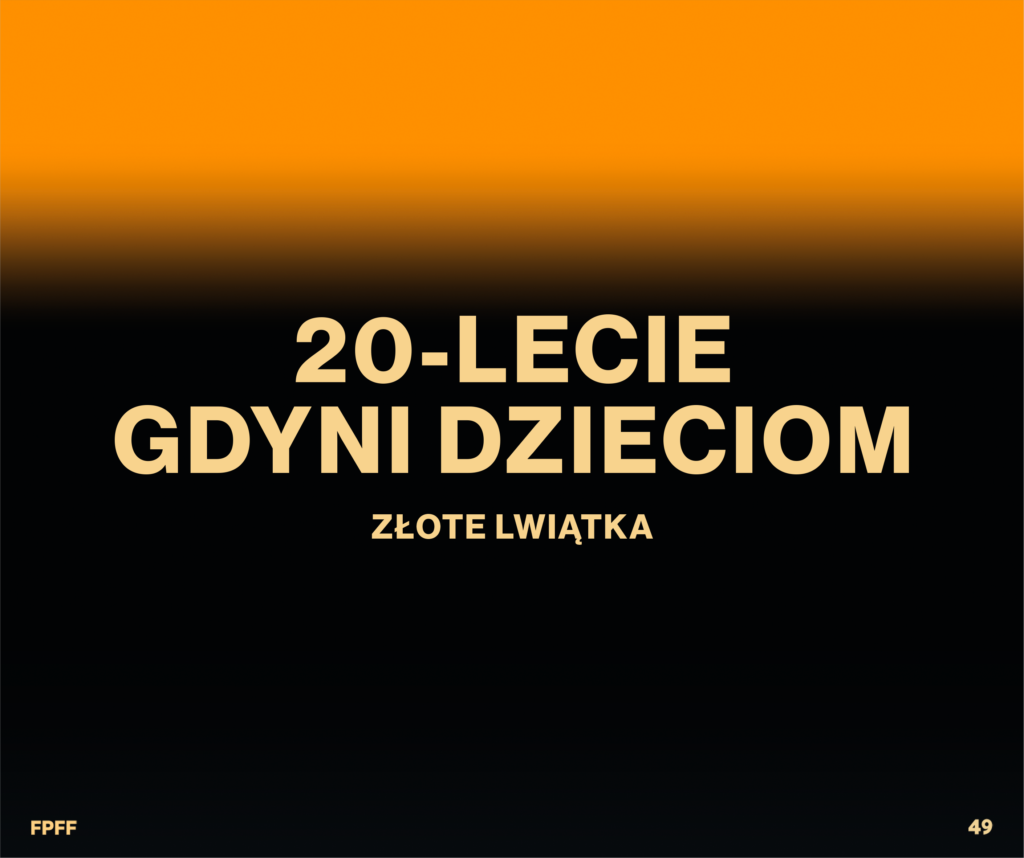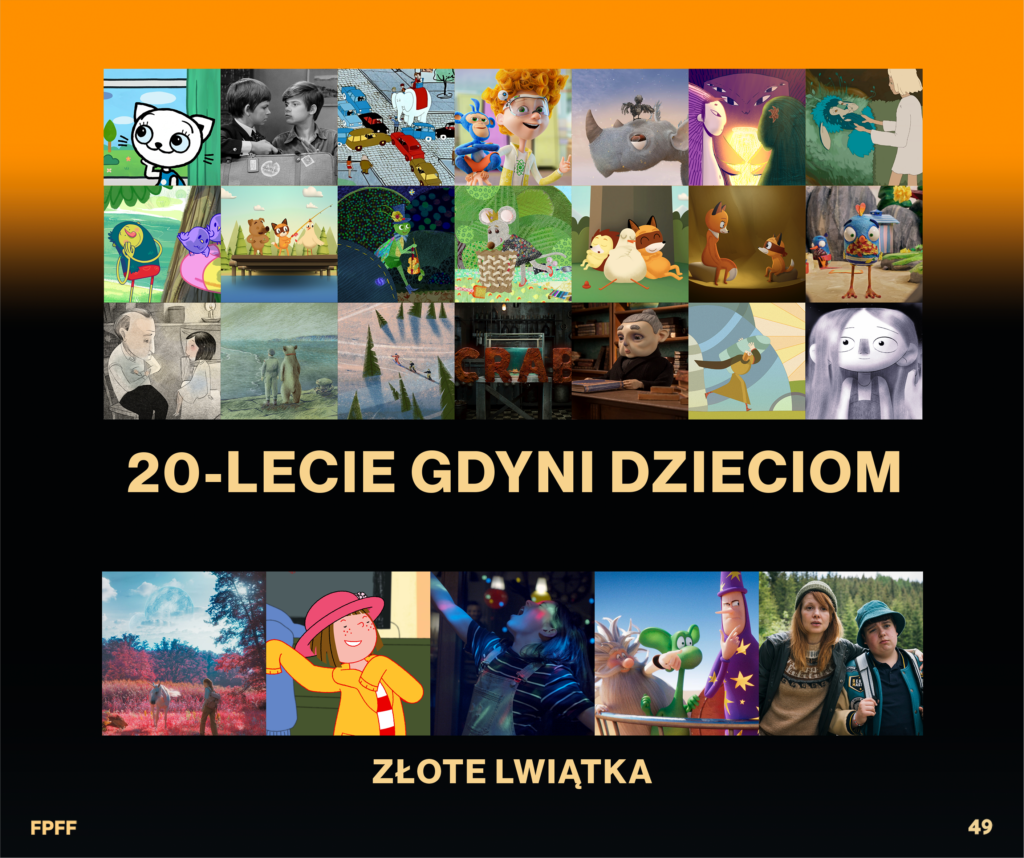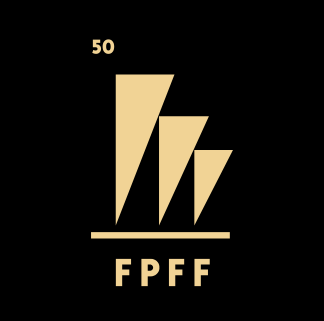20 years of Gdynia for Children and Janusz Korczak Golden Lion Cubs at the 49th PFF

For twenty years now, the Polish Film Festival in Gdynia has been shaping the imagination and sensitivity of young audiences. All thanks to the Gdynia for Children section, part of the Polish Film for Young Audiences project. Owing to the cooperation with the Polish Filmmakers Association, every year the programme includes exceptional proposals of films for children and youth – live-action and animated, feature and documentary, the latest and the classics.
There have been two decades of the Gdynia for Children section behind us and careful, consistent work bringing Polish cinema closer to young audiences and supporting children’s film authors. We have kept our finger on the pulse, noted the changes that have taken place in this part of Polish cinema, evoked the classics, talked and discussed. Gdynia for Children has become an integral part of our festival, to the point where it’s difficult to envision the event without this programme. We are celebrating the twentieth anniversary of this section at a time when Polish film for young audiences is experiencing a very successful period. And this is the best gift for all of us on this anniversary! – comments PFF Artistic Director Joanna Łapińska.
Twenty years ago, when the Polish Filmmakers Association initiated the Polish Film for Young Audiences programme, we had a dream – a dream that young audiences in Poland would be able not only to watch, but also to actively participate in the world of film, so that cinema would become an integral part of their lives and development. Today, with full confidence, I can say that this dream has come true in a way that has exceeded our wildest expectations. Polish Film for Young Audiences is not only about film screenings. It is a platform that over these twenty years has become a place for meetings, workshops, competitions and interactions with filmmakers. Gdynia for Children, which takes place during the Polish Film Festival, is the main event in the calendar of Polish Film for Young Audiences. The participants of its early editions have not only become seasoned cinephiles, but many have also chosen to pursue careers in the film industry. I am pleased to see that Polish cinema, aimed at family audiences, is rebuilding its position year after year, while at the same time having increasingly compelling stories to offer to the next generation of debuting film enthusiasts – says Grzegorz Łoszewski, President of the Polish Filmmakers Association.
The film journeys big and small
This year’s edition of Gdynia for Children will start with Diplodocus, a full-length animation inspired by the cult comic books by Tadeusz Baranowski. Wojciech Wawszczyk’s film is an appealing story of an adventurous little dinosaur who embarks on an unforgettable journey through the strangest lands to find his lost family. The pre-premiere screening with the creators of Diplodocus will take place on the first day of the Festival at 9.00 a.m. on the Large Stage of the Musical Theatre, which means that – as every year – the Gdynia for Children section will mark the beginning of the Polish Film Festival. Also on day one of the Festival, the Large Stage will host the screening of Too Old for Fairy Tales 2 at 1.00 p.m. This sequel to Kristoffer Rus’ hugely successful family film is not only an action-packed adventure full of computer games but also a touching story about what matters most: love, friendship, and the pursuit of dreams.
The other screenings of the Gdynia for Children section (Tuesday to Friday), organised by the Polish Filmmakers Association in cooperation with the Pomeranian Film Foundation, will take place at the Consulate of Culture. Preschoolers will enjoy new episodes of animated series with their favourite characters, Basia (Basia. I’m Just Right) and Kitty Kotty (Kitty Kotty at the Kindergarten). In these episodes, Basia explores a playground and a museum, tackles fashion challenges, and deals with allergies. Meanwhile, Kitty Kotty will be busy tinkering, riding her bicycle, and visiting a playground and kindergarten. In addition, the youngest viewers will see episodes of Toru Superfox, Patchwork Kingdom, Giggle Wiggle and Lemon and Berry.
Slightly older children (ages 7–12) can enjoy A Great Worry, a visually charming and philosophically profound film by Zbigniew Kotecki, a parable about how true happiness begins with self-discovery. They can also watch Tomek Niedźwiedź’s hilarious Smartphone from the Crazy Inventions series, Anastasiya Misiukevich’s ecological cautionary tale Emerald Web, and Julia Hazuka’s The Grand Mother, featuring The Great Arachnid. For slightly older viewers (ages 10+), there is Piotr Chmielewski’s suspenseful Crab, Kasia K. Pieróg’s Sister, which highlights the importance of others, especially family, Agata Gorządek’s Thrown Away Book, which deals with loss and loneliness, and Jakub Dolny’s charming Great Little Giant, inspired by an Irish legend.
Among new domestic animations for young audiences (12+), three notable titles stand out as animated documentaries. Magda by Adela Kaczmarek follows the story of a fifteen-year-old heroine who becomes a soldier in the Highland Brigade in 1940. A Bear Named Wojtek, directed by Ian Gardner, recounts the remarkable true story of a bear adopted by Polish soldiers during the battle of Monte Cassino. Lastly, The Sleeplessness of Jutka, directed by Maria Görlich-Opyd, is a poignant adaptation of Dorota Combrzyńska-Nogala’s book (illustrated by Joanna Rusinek). It tells the story of a seven-year-old girl who, expecting a holiday in Łódź, finds herself trapped with her grandfather and aunt in the Jewish ghetto.
Other full-length films for young audiences offer plenty of entertainment. Girls’ Stories by Aga Borzym is a gripping documentary that explores themes of growing up, first love, and the highs and lows of school life, and it’s engaging for both girls and boys. Additionally, a new, modernised adaptation of Kleks Academy, based on Jan Brzechwa’s novel and directed by Maciej Kawulski, features Tomasz Kot as the eccentric teacher.
Last but not least, two true rarities are must-see screenings for those who haven’t yet watched them and a sentimental journey for those who have. Please, Mr Elephant (1978) by Witold Giersz is an animated adaptation of Ludwik Jerzy Kern’s charming tale about a friendship between Pinio, a boy of short stature, and a small porcelain elephant that, after being fed large doses of vitamins, grows to the size of a real one. Trip for One Smile (1972) by Stanisław Jędryka is a film adaptation of Adam Bahdaj’s bestselling novel about the adventures of two boys who hitchhike from Kraków to Hel during holidays. Both films are among the 20th-anniversary hits selected by the Polish Filmmakers Association’s Young Audience Film Directors Club to celebrate the two decades of the Polish Film for Young Audiences programme.

Janusz Korczak Golden Lion Cubs
The Janusz Korczak Golden Lion Cubs Award will be presented at the PFF for the third time – there are five films for children and youth nominated for the award. The winner will be selected by audience vote, and the award will be presented at the Young Gala on 27th September. Films nominated for the award: Wojciech Wawszczyk’s animation Diplodocus, Kristoffer Rus’ family film Too Old for Fairy Tales 2, Aga Borzym’s documentary film Girls’ Stories, Kleks Academy by Maciej Kawulski and animated series Basia. I’m Just Right. Additional screenings of nominated films, accompanied by meetings with the filmmaker, will be held at Helios Cinema. Partner of the Golden Lion Cubs Award is KGHM Miedź. Thanks to the support, Festival audience will watch films from this section for a symbolic one zloty. Sale of tickets for screenings held at Helios Cinema will start in September.
_______
Films nominated for the Janusz Korczak Golden Lion Cubs award:
Diplodocus, directed by Wojtek Wawszczyk
Too Old for Fairy Tales 2, directed by Kristoffer Rus
Basia. I’m Just Right, directed by Marcin Wasilewski
Girls’ Stories, directed by Aga Borzym
Kleks Academy, directed by Maciej Kawulski
Partner of the Golden Lion Cubs Award is KGHM POLSKA MIEDŹ. Thanks to the support, Festival audience will watch films from this section for a symbolic one zloty.
_______
Gdynia for Children section is organised by the Polish Filmmakers Association in cooperation with the Pomeranian Film Foundation in Gdynia. The project is co-financed by the Polish Film Institute. It is organised under the honorary auspices of: UNICEF Polska, The Ombudsman for Children, Polish Teachers Association. Media Patrons: Magazyn Filmowy and Rzeczpospolita. Partners: Lirene and Film Educators Team.
Programme of the 20th edition of the Gdynia for Children section


